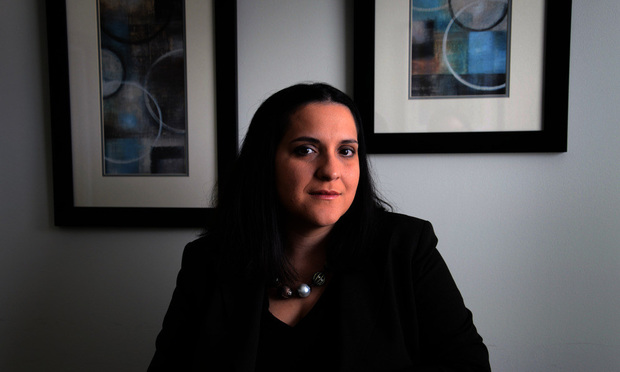Broward Lawyer Suspended by Bankruptcy Judge After 'Farcical Attempt to Avoid Accountability'
"Now that the court has looked, it cannot look away," said a court order by U.S. Bankruptcy Judge John K. Olson, who suspended Pembroke Pines attorney Maite Diaz from his court for allegedly filing unsworn and unverified documents.
July 10, 2019 at 03:34 PM
4 minute read
 Maite Diaz of Maite L. Diaz in Pembroke Pines. Photo: Melanie Bell/ALM.
Maite Diaz of Maite L. Diaz in Pembroke Pines. Photo: Melanie Bell/ALM.
U.S. Bankruptcy Judge John K. Olson has suspended an attorney from his court for two years and recommended disbarment after she allegedly filed numerous unsworn and unverified documents on behalf of clients.
The judge's 172-page order chastised Pembroke Pines solo practitioner Maite Diaz over her alleged “farcical attempt to avoid accountability” by initially failing to comply with a court order requesting certain case files and later providing incomplete records.
The failure to comply was “mind boggling” according to Olson, who wrote that Diaz's conduct throughout proceedings has “reeked of bad faith.”
Olson has recommended disbarment and referred Diaz's case to the Florida Bar, the Office of the U.S. Trustee, the U.S. Attorney for the Southern District of Florida and its Ad Hoc Committee on Attorney Admissions, Peer Review and Attorney Grievance.
The judge said he was forced to take extreme measures after finding a “multitude of extremely serious violations” when reviewing files Diaz submitted.
“Unfortunately, the court has opened Pandora's Jar,” Olson wrote, later adding, “Now that the court has looked, it cannot look away.”
Diaz, through her Miami attorney Ramon de la Cabada, declined to comment.
'Scattered and disorganized'
The probe stemmed from a May 2018 Chapter 7 bankruptcy case in which Diaz represented debtor Aldo Pina. Three months in, Chapter 7 trustee Leslie S. Osborne filed a complaint against Pina, alleging Pina had fraudulently withheld financial records and threatening to revoke the debtor's bankruptcy discharge.
Days later, Diaz moved to withdraw from the case and debtor Pina continued pro se, according to Olson's order. But when the debtor claimed he hadn't seen or signed particular schedules that had been filed, the trustee moved for sanctions against Diaz. The trustee also alleged that Diaz should have filed certain motions in the case and made changes to schedules.
Diaz responded by citing attorney-client confidentiality and arguing that the trustee painted her as “somehow derelict or deficient” without basing the motion on a rule violation.
Attorney Elias Dsouza began representing Pina pro bono, according to Olson's order, which said a subsequent hearing revealed that the debtor hadn't signed schedules and a statement of financial affairs that Diaz had filed on May 30, 2018, but had signed slightly different draft versions at a meeting three weeks earlier.
The court asked Diaz to provide certain documents, but to its “shock and dismay,” she instead filed a response to the court's order. In it, Diaz said she hoped to “save the court from performing a time-consuming review of over 100 filings.”
Diaz's motion conceded that she had submitted documents that weren't exactly the same as the ones her client signed because she didn't require clients to return to her office and resign documents unless changes were materially significant. Diaz admitted ignorance in the motion and said she had changed her practice in response to the inquiry.
But Olson wasn't having it.
“The court finds that this refusal to produce documents as directed, shrouded under the purported auspices of saving the court from the 'time consuming review of over 100 filings,' was a last-ditch effort to keep the lid on Pandora's Jar,” Olson's order said.
Diaz submitted a box of documents in response to a second order, but the contents were “absolutely appalling,” according to Olson, because she'd left out 17 cases he'd asked for and included 15 that he hadn't.
“Upon consideration, the court supposes that attorney Diaz may have purposefully omitted these files because they reflect especially poorly upon her, above and beyond the horrors produced in the banker's box,” Olson wrote.
In one of the missing cases, Diaz was suspended over repeated delays and had promised the court she would “clean up her practice and slow down,” according to the order. Of the 84 case files Diaz did submit, many were missing information and were apparently “scattered and disorganized.”
The alleged violations would have been more difficult with paper filings, but were possible through the CM/ECF filing system, the way Olson saw it, because the court's electronic system is ”dependent upon the integrity of the lawyers who file … using the system.”
Diaz's two-year suspension begins Aug. 1.
Read more:
Judge & Jailer: This Bankruptcy Judge Has Thrown Attorneys, Debtors Behind Bars
10-Year Disbarment Considered for Miami Lawyer Accused of Targeting Opposing Counsel
2 South Florida Attorneys Disciplined by State Supreme Court
This content has been archived. It is available through our partners, LexisNexis® and Bloomberg Law.
To view this content, please continue to their sites.
Not a Lexis Subscriber?
Subscribe Now
Not a Bloomberg Law Subscriber?
Subscribe Now
NOT FOR REPRINT
© 2025 ALM Global, LLC, All Rights Reserved. Request academic re-use from www.copyright.com. All other uses, submit a request to [email protected]. For more information visit Asset & Logo Licensing.
You Might Like
View All

Holland & Knight Expands Corporate Practice in Texas With Former Greenberg Traurig Partner
3 minute read
Forum Clause Axes $844M Case Against Reinsurer Over Deadly Plane Crash, Judge Rules

Latest Boutique Combination in Florida Continues Am Law 200 Merger Activity
3 minute readTrending Stories
- 1SEC Sued for Failing to Reveal Records Involving Simpson Thacher Attorney
- 2Lawsuit accuses University of California of racial discrimination in admissions
- 3Data Breaches in UK Legal Sector Surge, According to ICO Data
- 4PayPal Faces New Round of Claims; This Time Alleging Its 'Honey' Browser Extension Cheated Consumers
- 5Fired NLRB Member Seeks Reinstatement, Challenges President's Removal Power
Who Got The Work
J. Brugh Lower of Gibbons has entered an appearance for industrial equipment supplier Devco Corporation in a pending trademark infringement lawsuit. The suit, accusing the defendant of selling knock-off Graco products, was filed Dec. 18 in New Jersey District Court by Rivkin Radler on behalf of Graco Inc. and Graco Minnesota. The case, assigned to U.S. District Judge Zahid N. Quraishi, is 3:24-cv-11294, Graco Inc. et al v. Devco Corporation.
Who Got The Work
Rebecca Maller-Stein and Kent A. Yalowitz of Arnold & Porter Kaye Scholer have entered their appearances for Hanaco Venture Capital and its executives, Lior Prosor and David Frankel, in a pending securities lawsuit. The action, filed on Dec. 24 in New York Southern District Court by Zell, Aron & Co. on behalf of Goldeneye Advisors, accuses the defendants of negligently and fraudulently managing the plaintiff's $1 million investment. The case, assigned to U.S. District Judge Vernon S. Broderick, is 1:24-cv-09918, Goldeneye Advisors, LLC v. Hanaco Venture Capital, Ltd. et al.
Who Got The Work
Attorneys from A&O Shearman has stepped in as defense counsel for Toronto-Dominion Bank and other defendants in a pending securities class action. The suit, filed Dec. 11 in New York Southern District Court by Bleichmar Fonti & Auld, accuses the defendants of concealing the bank's 'pervasive' deficiencies in regards to its compliance with the Bank Secrecy Act and the quality of its anti-money laundering controls. The case, assigned to U.S. District Judge Arun Subramanian, is 1:24-cv-09445, Gonzalez v. The Toronto-Dominion Bank et al.
Who Got The Work
Crown Castle International, a Pennsylvania company providing shared communications infrastructure, has turned to Luke D. Wolf of Gordon Rees Scully Mansukhani to fend off a pending breach-of-contract lawsuit. The court action, filed Nov. 25 in Michigan Eastern District Court by Hooper Hathaway PC on behalf of The Town Residences LLC, accuses Crown Castle of failing to transfer approximately $30,000 in utility payments from T-Mobile in breach of a roof-top lease and assignment agreement. The case, assigned to U.S. District Judge Susan K. Declercq, is 2:24-cv-13131, The Town Residences LLC v. T-Mobile US, Inc. et al.
Who Got The Work
Wilfred P. Coronato and Daniel M. Schwartz of McCarter & English have stepped in as defense counsel to Electrolux Home Products Inc. in a pending product liability lawsuit. The court action, filed Nov. 26 in New York Eastern District Court by Poulos Lopiccolo PC and Nagel Rice LLP on behalf of David Stern, alleges that the defendant's refrigerators’ drawers and shelving repeatedly break and fall apart within months after purchase. The case, assigned to U.S. District Judge Joan M. Azrack, is 2:24-cv-08204, Stern v. Electrolux Home Products, Inc.
Featured Firms
Law Offices of Gary Martin Hays & Associates, P.C.
(470) 294-1674
Law Offices of Mark E. Salomone
(857) 444-6468
Smith & Hassler
(713) 739-1250






